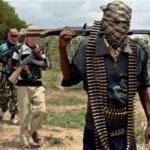The United States Congress on Thursday convened a hearing, titled “President Trump’s Redesignation of Nigeria as a ‘Country of Particular Concern’: A Serious, Well-Founded Wake-Up Call,” to discuss the state of religious freedom in Africa’s most populous nation.
The hearing was convened by the U.S House of Representatives Foreign Affairs’ Africa Subcommittee and chaired by House Foreign Affairs Africa Subcommittee Chairman Chris Smith.
During the Congress’s hearing on Nigeria’s CPC designation, lawmakers and Nigerian pastors brought forth harrowing testimony and calls for immediate, tangible action from the Nigerian Government.
Here are some takeaways from the Congress’s hearing on Nigeria’s CPC designation.
Trump Must Back CPC Designation With Actions– Bishop Anagbe
The Bishop of the Catholic Diocese of Makurdi, Wilfred Anagbe, spoke during the Congress’s hearing on Nigeria’s CPC designation.
During his address, Anagbe urged the United States President Donald Trump to match his designation of Nigeria as a Country of Particular Concern with concrete action.
He said: “On behalf of millions of Christians in Nigeria and in the diaspora, we want to thank President Donald Trump for his bold leadership in designating Nigeria as a CPC. I commend you and this subcommittee for your ongoing efforts on this matter.
“It is a vital step, but must be backed by serious action. One, use the Magnitsky Act for targeted sanctions against Nigerian government officials and others tolerating or condoning Islamic violence in the country,” Anagbe said.
The Bishop urged lawmakers to tie security and humanitarian aid to measurable improvements.
“Expand humanitarian support for IDPs. The IDPs must return to their ancestral homes, and this requires security guarantees from the Nigerian Government,” he said.
Survivor of Yelwata Attack Narrates Harrowing Experience
During the Congress’s hearing on Nigeria’s CPC designation, a survivor of the Yelwata attack in Benue State, Msurshima Apeh, has narrated her ordeal.
Apeh narrated how terrorists killed her five children during the attack on Yelwata.
She said: “When we went to sleep that night around 9 pm, the Fulani terrorists attacked us where we were sleeping. We were locked inside the camp, Yelwata, and they were butchering them with cutlasses and shooting guns as well.
“When the torture had finished at some point in time, they poured petrol on the building and the majority of them were set ablaze.
“In the course of this action, I saw a tree when I lifted my eyes. I raised my hands on the tree and climbed up where I was able to hide myself. My five children that I left below were crying, and in my presence, they were being slaughtered by the terrorists.
“I ran out into the bush at some point, and those who came for rescue will now bring me out of that place at some point, and I was able to witness the whole drama. When the people came, we were now relocated to a new camp,” the witness said.
Pan-Atlantic Kompass reports that the Yelwata attack occurred in June 2025 in the Guma Local Government Area of Benue State. Reports estimated the death toll at over 200 people, while more than 3,000 people were displaced.
U.S Congressman Huizenga Accuses Tinubu’s Govt of Failing to Protect Christians
Speaking during Congress’s hearing on Nigeria’s CPC designation, a U.S Congressman, Bill Huizenga, has accused the administration of President Bola Tinubu of allegedly “sitting back” and failing to address worsening insecurity in Nigeria.
Huizenga also lambasted Tinubu’s administration for allegedly covering up the killings of Christians in Nigeria.
He said: “It ought to be outrageous that it is Christians, moderate Muslims, and anyone being terrorised by these radicalised Islamists in Nigeria, and we’ve got the Tinubu government sitting back and not doing enough. I was recently interviewed by Nigerian television, and that was really their question. Is the Tinubu government doing enough? And I had to answer, ‘No, they are not.’
“And I do not understand how a delegation can come here to the United States and downplay and come up with all of these other excuses as to why this is allowed to happen. It should be rejected and should be called out for what it is.
“I went to school with kids from Nigeria. We’ve got neighbours who’ve been missionaries there, who have family there, who have friends there, who know this is going on. Yet, we’ve got not just the mass media, we’ve got people within the Congress denying that this is happening, or certainly de-emphasising it,” he said.
Huizenga recalled a Christmas Eve 2023 attack that killed 200 people and said the incident showed that security conditions had not improved.
Questioning the pattern of religious attacks in the country, he asked, “Do we see Christians killing Muslims the way radicalised Islamists kill Christians in Muslim areas?”
Trump’s Military Action Threat is ‘Reckless’ – Congresswoman
Meanwhile, a U.S Congresswoman, Sara Jacobs, has faulted United States President Donald Trump’s military threat to Nigeria over alleged Christian genocide.
According to Jacobs, Trump’s threat is “reckless”.
“President Trump’s threat is reckless, and any unilateral military action in Nigeria is illegal. Congress has not authorized force in Nigeria to protect Christians,” the member of the House Foreign Affairs Committee and a Ranking Member of the Subcommittee on Africa, said during the event.
She said the violence affects both Christians and Muslims, asking the Nigerian government to do more to protect its citizens.
How to Solve Nigeria’s Insecurity– CSIS Director
The Director of the Africa Programme at the Centre for Strategic and International Studies, Oge Onubogu, during her speech at the Congress’s hearing on Nigeria’s CPC designation, recommended the engagement of faith communities and the appointment of a Nigerian ambassador to the U.S as part of ways to address insecurity in the West African country.
According to her, “engaging with communities of all faiths, supporting moderate leaders, tying security assistance to governance reforms, and working more closely with state and local authorities,” will help solve mass killings in Nigeria.
The CSIS Africa director further recommended that Tinubu should appoint “a capable Nigerian ambassador to the US” to address mass killings and insecurity in the country.
She noted that U.S.–Nigeria relations remain complicated despite shared interests in counterterrorism and economic development. She added that Nigeria holds significant regional influence but faces persistent instability.
“Nigeria’s instability stems from a key shortcoming. Despite 64 years of independence, it has yet to establish a national identity grounded in basic freedoms and dignity,” she said.
Onubogu told the committee that insecurity in Nigeria stems from layered governance failures, historical grievances, and social tensions rather than a single religious narrative.
She recalled her upbringing in Jos and her family’s history in Christian missionary work and warned against a narrow narrative that reduces the crisis to Christian persecution.
“A narrow narrative that frames Nigeria’s security situation solely as the persecution of Christians oversimplifies the issue.
“Religious and ethnic violence is driven more by governance failures and worsened by hate speech and conspiracy theories,” she said.





